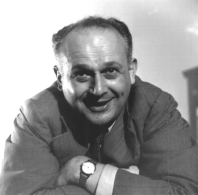 Moshe Feldenkrais, DSc, was a distinguished scientist and engineer whose career included work in early nuclear research at the Curie Institute in Paris in the 1930’s working with Joliot-Curie. In Paris he met Jigaro Kano, the creator of modern judo, and became one of the first European black belts in Judo, and a founder of the Ju Jitsu Club in Paris. During the WWII he set up one of the first British judo clubs in Scotland where he was stationed working on anti-submarine warfare for the British Navy.
Moshe Feldenkrais, DSc, was a distinguished scientist and engineer whose career included work in early nuclear research at the Curie Institute in Paris in the 1930’s working with Joliot-Curie. In Paris he met Jigaro Kano, the creator of modern judo, and became one of the first European black belts in Judo, and a founder of the Ju Jitsu Club in Paris. During the WWII he set up one of the first British judo clubs in Scotland where he was stationed working on anti-submarine warfare for the British Navy.
It was, however, in the relationship between bodily movement and our ways of thinking, feeling and learning that Feldenkrais achieved his greatest success. An injury to his knee in his youth threatened him with severe disability in middle age.
Despite being given little hope of ever walking normally, Feldenkrais refused surgery and instead used his own body as his laboratory. He merged his acquired knowledge with his deep curiosity about biology, perinatal development, cybernetics, linguistics, and systems theory. He taught himself to walk again and in the process developed an extraordinary system for accessing the power of the central nervous system to improve human functioning.
Feldenkrais studied intensively in psychology, neurophysiology, and other health-related disciplines, and in 1949 he returned to Israel where he continued to integrate and refine his ideas into the system known as the Feldenkrais Method
During the process he realised the vital importance of working with the whole body and indeed the whole self in order to achieve lasting, radical change. His insights contributed to the development of the new field of somatic education, and continue to influence disciplines such as physical medicine, gerontology, the arts, education and psychology.